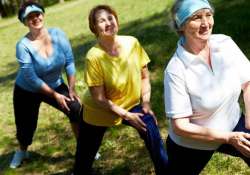At genetic risk for diabetes? You need to exercise more
London: While exercise is good for everyone, those with an immediate relative - mother, father or sibling - with Type-2 diabetes need to exercise more than others to derive the same preventive benefit, says a

London: While exercise is good for everyone, those with an immediate relative - mother, father or sibling - with Type-2 diabetes need to exercise more than others to derive the same preventive benefit, says a study.
The cause of Type-2 diabetes is linked to both genetics and lifestyle. If you have an immediate relative with the condition, the risk of contracting the diabetes is about three times higher. Preventive treatments involve eating healthier and exercising more.
For this study, researchers at Lund University in Sweden analysed the effects of exercise in people with increased risk of Type-2 diabetes caused by being immediately related to someone with the disease.
The participants consisted of a total of 50 unfit, slightly overweight but completely healthy men in their 40s who, for seven months, exercised regularly at a fitness centre.
Also read: Beware! Smoking can lead to diabetes too!
Half of them belonged to the risk group and the other half served as a control group who did not have relatives with Type-2 diabetes.
The participants were offered three training sessions per week, including a spinning class and two aerobics classes, during which their exercise intensity and energy consumption was measured.
The exercise routine for both groups was equally hard, but the risk group attended more sessions and as a group expended more energy than the control group.
After making adjustments to account for the differences, the results showed that both groups benefited from exercising -- they all lost weight, reduced their waist size and increased their fitness.
"The difference was that participants from the risk group had to exercise more to achieve the same results as the participants from the control group," said lead researcher Ola Hansson from Lund University.
"We now hope to continue with further studies, including examining whether exercise intensity rather than volume is a crucial factor in determining how the risk group responds to exercise," Hansson said.
The findings appeared in the Journal of Applied Physiology.